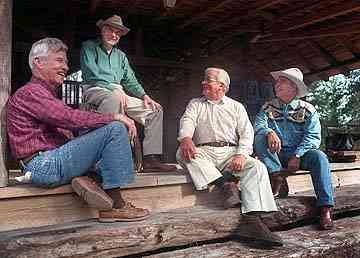Century, Florida
Where it all began for Chiles...the 1,003 mile, 91-day road to the U.S. Senate. I'll be going all the out to Century, into Central Standard Time, soon and will return with lots of pictures. Apparently the walk started at Granny Hattie's Restaurant. I'll have to look it up!
Well, we started off yesterday morning at 8:30 at Century, Florida. Century is a town that is primarily a sawmill town, and it's on the Florida - Alabama line.
The first fellow that I saw I had to lure down off a power pole. He kept trying to get a word in and I kept talking to him about my running for the United States Senate and finally he got an opportunity to break in and tell me he was from Alabama. I just told him I sure hoped he had some Florida friends to pass the word on to.
We talked with a number of people in Century and had breakfast there. At first they wanted to talk only about the 800-mile plus walk before me, but then everybody started telling me about the Jay hill which lay ahead of me on the way to Jay.
I don't believe it was more than three or four miles but it looked like eight miles when I started up. The word was that if I could make it up the Jay hill, the trip would be coasting the rest of the way to the Keys. I thought I had made it up and stopped to rest. About that time Officer Wood, a highway patrolman who used to be stationed in Lakeland, came by and stopped to see what I was doing there. He broke it to me that I was only halfway up the hill. It was kind of a blow cause I hadn't realized that when the road curved ahead, I'd have another half of the hill to traverse.
They're breaking ground for their crops up here and the wind is blowing good and hard so everything is red sand and red dust. By the time I walked into Jay I looked like a red man. I met John Pittman at the electric co-op here and I think he felt so sorry for me — my hair looking so bad and I had so much dust on my face — he decided to take me home to dinner. I went to his house and we had collard greens and fried chicken and dressing and rice and apple popovers for dessert. I can tell you one thing: I haven't had an appetite like that in a long time. I had all that dinner and then finished up with another piece of chicken for dessert.
I reached Jay about noon and after I had lunch it looked like it was starting to rain, so I went to the livestock auction. That worked out real well because there were some 200 farmers there. By the time I got there, the bottom had fallen out —a real cloudburst. It would have been impossible to walk the streets of Jay and visit with the people.
There was a break in the auction and I was able to get on the microphone and give them a little talk about my campaign, to tell them why I was walking and talking through the state of Florida. And I had a good opportunity not only to talk but to do some listening. I found out a lot about the problems of the row farmer.
The people are trying to raise wheat and soy beans up here and one them was telling me that of a loaf of bread, the farmer himself gets about two and a half cents; and with their costs for fertilizer, help and tractors and everything going up continually, they're really caught in a squeeze. They're particularly hurt by the high interest rates, having to borrow a lot of money every year to make their crops. They're very disturbed with the government buying wheat and corn in other parts of the country and holding it till they're ready to put theirs on the market. Then the government starts to sell their holdings and that breaks the market. It keeps them from being able to make a profit. They don't want to see government controls and yet they feel that is the way they're heading unless they can get together in some kind of co-op and do more to see that the farmer gets a decent price for his goods and that all the profits aren't taken up by the middleman and the people handling the end product.
They had a lot of good looking livestock — hogs and cattle. Prices for them seemed to be pretty good. The row farmer is the one who's really having a tough time of it. It's great to have my feet on the ground and to be with good Florida people, to learn from them and to tell them of my ideas. This day has certainly confirmed my belief that there is a crying need to bring more of our government back closer to home and to the people it is intended to serve.




























